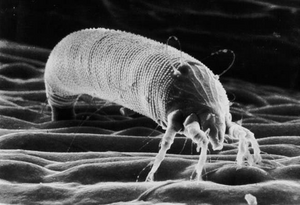Aceria tosichella
| Literature database |
|---|
| 73 articles sorted by: |
| • year (descending) |
| • research topics |
| • countries/regions |
| • host plants |

Author(s): P.E. Sloderbeck, Entomology, Kansas State University , U.S.A.
Source: Entomology Department, Kansas State University, U.S.A.
Aceria tosichella Keifer, 1969 - (wheat curl mite)
The mite is wide-spread in temperate regions and infests wheat and other cereals. It also has other hosts on which it can survive between cropping seasons. It is an important vector of several cereal viruses, like High Plains wheat mosaic virus and Wheat streak mosaic virus. The combination of the mite and virus might result in total yield losses in wheat.
The mites are less than 0.3 mm long, white and cylindrical. At high infestations they cause inward curling of the leaf blades and deformations. Because of their small size, the mites easily drift through the air and can be transported over considerable distances. The dispersal is assisted by their tendency to accumulate at the leaf tips. The development from egg, through the larval and nymphal stages, to the adult stage can be as short as 7 days during optimal conditions. The eggs can survive freezing temperatures.
Synonyms:
Aceria tritici